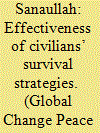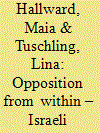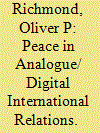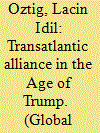| Srl | Item |
| 1 |
ID:
174605


|
|
|
|
|
| Summary/Abstract |
Civilians deploy various strategies to survive violence in armed conflicts; literature, however, does not debate the relative effectiveness of such strategies. This article answers how certain strategies are valued and are employed frequently in comparison to others. Based on qualitative fieldwork in Swat Valley undertaken in 2016 to 2019, where Taliban insurgents fought against the State of Pakistan in 2007–09, the research finds that civilians deployed resistance, accommodation, resolution, readjustment and withdrawal to survive. It further finds that as violence intensifies, strategies of resistance and accommodation give way to strategies of readjustment and withdrawal.
|
|
|
|
|
|
|
|
|
|
|
|
|
|
|
|
| 2 |
ID:
174608


|
|
|
|
|
| Summary/Abstract |
Nowadays hybrid warfare is considered a significant security challenge; within this wider threat category are cyber incidents that are considered one of the main perceived threats in modern society for every country. The number of incidents in cyber space is constantly growing, but methods of its realisation are evolving. One of the most dangerous consequences of cyber-attacks is a planned or spontaneous chain effect that is accompanied by destructive results. Ukraine is used as a contemporary example of this type of attack and subversion. This is later put into context with trends and events on a wider international level that imply legal regulation conflicts with political and operational expediency in managing the problem of cyber-attacks.
|
|
|
|
|
|
|
|
|
|
|
|
|
|
|
|
| 3 |
ID:
174603


|
|
|
|
|
| Summary/Abstract |
Protests in response to Israeli military action in the Occupied Territories have a long history in Israel. While such opposition movements in many countries are comprised of civil society activists, the dynamics of protest differ in Israel because of the country’s mandatory military service. From the 1980s to present day, former and current Israeli soldiers have used a wide range of methods, tactics, and strategies to challenge Israeli military actions. Using insights from nonviolent resistance theories, we examine how the approaches and goals of military opposition groups in Israel have changed over the past decades. Specifically, we develop a typology to explain why different types of protest arise from within the Israeli Defense Force that garner strong reactions – whether laudatory or derogatory – from the Israeli government and general public. The paper concludes with lessons learned for military opposition movements in the context of nonviolent resistance theory and practice.
|
|
|
|
|
|
|
|
|
|
|
|
|
|
|
|
| 4 |
ID:
174607


|
|
|
|
|
| Summary/Abstract |
This article outlines a preliminary perspective of peace in IR resting on analogue and digital versions in mainstream and critical forms. It discusses their implications for long standing key debates in the discipline about war and peace. It argues that digital IR/ international relations were initially thought to be a breakthrough for global civil society and rights, which promised a more emancipatory form of peace by allowing individuals and civil society to challenge power structures more effectively, and by curtailing the bounding effects of territorialism, sovereignty and nationalism. This gave critical forms of agency space to network. However, a brewing ‘counter-revolution’ of what might be now called the ‘ancien regime’ once again, points to digital forms of governmentality, which replicates the liberal and neoliberal governmentalities of the last few decades. This may make the analogue ‘liberal peace’ look like a virtuous high-water mark in recent history. Furthermore, a digital version of peace has yet to be developed.
|
|
|
|
|
|
|
|
|
|
|
|
|
|
|
|
| 5 |
ID:
174604


|
|
|
|
|
| Summary/Abstract |
The number of Chinese nationals travelling, working, and residing outside of China has reached a historical high and will likely continue to grow. As China’s people and businesses conduct more and more of their activities overseas, domestic demand has increased for the PRC Government to take a more effective role in protecting Chinese nationals abroad. In tandem with larger shifts occurring in China’s conception of its global role including emerging ideas about great power responsibility, the desire to protect of nationals abroad will drive new concepts and approaches to international interventions in China, and may challenge long-held policies of upholding state sovereignty and non-intervention.
|
|
|
|
|
|
|
|
|
|
|
|
|
|
|
|
| 6 |
ID:
174606


|
|
|
|
|
| Summary/Abstract |
NATO has successfully adjusted itself in the political and security environment of the post-Cold war era through enlargement, focusing on conflict prevention, crisis management and peacekeeping. Currently, the most important challenge to NATO comes from within. Under businessman-turned-U.S. President Donald J. Trump who focuses his attention on ‘making America great again’, the issue of burden sharing has dominated NATO’s agenda. President Trump has pressured European countries to increase their defense spending to meet the 2% of GDP defense spending objective of NATO. While the previous U.S. presidents also pressured European states with regard to burden sharing, President Trump’s rhetoric differs from his predecessors by associating American commitment to the Alliance directly to the defense spending of NATO’s European members. Importantly, this article shows that despite Trump’s skepticism of NATO and his rhetorical pressure on its member states regarding the issue of burden sharing, there is no change in the American approach to NATO at the policy level.
|
|
|
|
|
|
|
|
|
|
|
|
|
|
|
|
| 7 |
ID:
174609


|
|
|